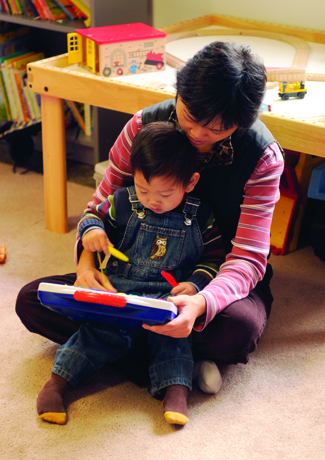The children’s place
By Shira Tevah, '09
Photography by Dan Dry
"Please take your shoes off at the entrance,” reads a sign at the Family Resource Center—regulars call it the FRC—on the second floor of University Church. Beneath the sign, a few tiny pairs of snow boots line a low shelf. Two sock-footed girls sit on Lilliputian yellow-and-orange chairs at an equally tiny table, smearing blue and pink frosting and affixing gumdrops on a gingerbread house. Two-and-a-half-year-old Kyler surreptitiously tastes the sweet glue—her mom is part of a discussion group in another room and not there to scold.

In the Family Resource Center, University parents can read and play with their kids.
“Oh no,” says Ruth Andrews, 3, “the a-king fell off!” Do you mean acorn?” asks student assistant Mary Hiebert. No, Ruth shakes her head. There’s a pause. “Ah, icing!” says her father, sitting nearby.
Hiebert, a master of arts in the humanities student, teaches arts and crafts on Mondays fall quarter. The six-week course is free, as is interactive Spanish for one- to four-year-olds. Ballet, taught by a U of C ballerina, is $45 for a ten weeks.
The center, which opened in October 2006 as a two-year pilot program funded by the University’s Women’s Board, aims to “improve the lives of student-parents,” says Director Lizanne Phalen. With a PhD in clinical psychology, Phalen joined the center in September 2008, after the University assumed full responsibility for its funding.
The FRC is not a licensed child-care facility. Instead it is designed as a resource to support University professional- and graduate-school student-parents juggling the demands of their educations and families. To that end, it offers classes for children up to age 7, free seminars and workshops for parents, special family activities, and what Phalen terms a “welcoming space.” Open weekdays from 9 a.m. to 5 p.m. during the academic year (and, starting this winter quarter, extended hours on Wednesday evenings), the center emphasizes its drop-in aspect, encouraging parents to bring their children to play, to stop by to change a diaper, or to grab a cup of coffee.
Parents have to be on the premises while their children play at the center, Phalen says, but some parents sit in the hallway and get reading done or attend a discussion while their child takes a class.
One set of parents used the center’s flexibility to form an ad hoc co-op. Begun in 2007, the group of 12 parents and six children meets at the center weekday mornings. Each day rotating pairs of parents (one has snack duty) stay to supervise the children, while the other parents head for errands or classes. The co-op is “independent and informal,” says Max, a student in East Asian languages & civilizations who has been coming to the FRC since its opening—an event that coincided with the birth of his son Oscar, now 2. Oscar kneels nearby, placing plastic dinosaurs in the bed of a large yellow Tonka truck. “Most of the parents are in the EALC department,” Bohnenkamp says, and the children speak Chinese, Japanese, Korean, and German. But “they can pretty much communicate any which way,” he says. “It’s like a mini United Nations.”
The largest of the center’s three playrooms has an arts-and-crafts corner with supplies, bookshelves, Legos, foam blocks, and a stereo playing classical music or the ABCs. The walls feature rainbows and stars. Next door are a fridge, microwave, highchair, and a bookshelf stocked with packets on pregnancy, immunizations, and nutrition. The playroom down the hall also has a parent-sized table for seminars and group discussions.
Parental programming includes an education series that Phalen leads; winter quarter she’s helping parents to slow down their lives. There are also discussion groups: Erika Schmidt, AM’01, director of clinical services for children at the city’s Institute for Psychoanalysis, facilitates one for parents of young children. “It gives me a new perspective,” says Jennifer L. Powell, who works at the Alumni Association and attends Schmidt’s group, “trying to think like children think.” Powell, the mother of two toddlers, likes that the parents get to work with professionals. “We’re not just parents talking to each other. We’re not just people commiserating.”
The FRC tries to fill a void in University-area resources. “It’s hard to be on the South Side,” Phalen says, where there is less programming for children between one and four than on the North Side. She knows that many parents wish to add child care to the agenda, but the center isn’t licensed to do so. Still, it offers programs such as Lab Schools teacher Katalin Babai’s “Pre-school Jump Start!” It’s a daily hour-and-a-half of story-time, songs, and rules. The class helps children separate from their parents, who stay in another room, and, Phalen says, is “very similar to what you’d get at a regular pre-school environment.” All for $45 per quarter.
Return to top